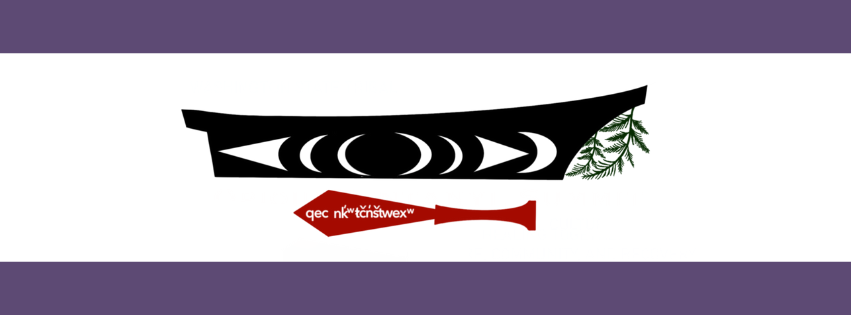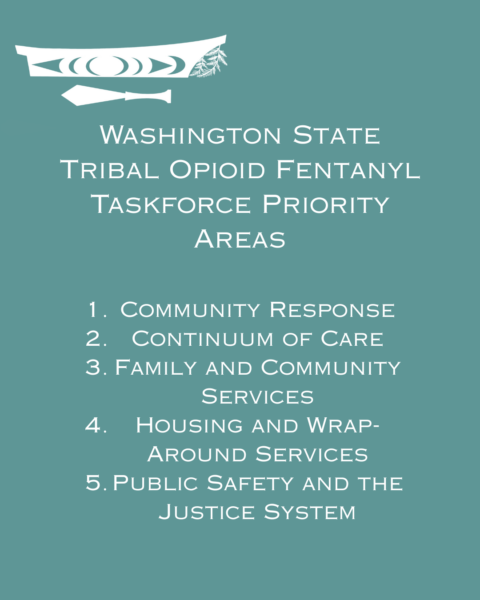
What to do if you think someone is experiencing an opioid overdose:
How to administer Naloxone – Click here for a quick video on how to administer Naloxone Nasal Spray. You can also find more information, including how to identify if someone is experiencing an overdose and written instructions on how to administer Naloxone at https://fornativelives.org/overdose.
Overdose Prevention, Recognition, and Response – Washington State Department of Health has information on how to recognize and respond to a potential overdose and how to administer Naloxone.
The Washington State Tribal Opioid Fentanyl Taskforce works to address five identified priority areas. The Washington Tribal Opioid Resource Exchange (WA TORE) is organized into these areas for easier use. Learn more about the taskforce here.

Are you a…
- Tribal Member needing resources?
- Tribal Clinic?
- Tribal Member with a family member who needs resources?
Find all the information you need here.
Community Response
Tribal leaders shared that they are hearing from people in their communities who are not specifically trained for responding to opioid and fentanyl use and its impacts but who are interacting with people who use and/or are impacted by opioid and fentanyl use. These frontline workers are people like childcare providers, bus drivers, case managers, Indian Child Welfare workers, teachers and other school staff, office staff in non-clinical settings, etc.
Continuum of Care
All people deserve access to effective, compassionate, timely, and culturally grounded services wherever they are on the continuum of use to recovery. This includes access to prevention, treatment, harm reduction, and recovery support services. There are many barriers within the systems in our state that keep people from receiving care when they need it.
Prevention
For Our Lives Campaign Prevention Toolkit – this includes print materials, videos, social media posts, digital graphics, and other materials. It’s all available at no cost to tribes or organizations serving Native people in Washington state.
Supporting the Health of Youth Who Use Fentanyl/Opioids: Staying Connected · Health & Safety – New Guide for parents of youth w/ OUD – Introduced at the SOR youth OUD learning collaborative and we’ll be incorporating it into a new project to expand the King County bupe hotline to adolescents and providing supports to parents.
Washington Teen Link: Call & Text 866-833-6546 – Teen Link is a peer-to-peer support line. If you are experiencing a mental health crisis, we encourage you to dial 988, any time, day or night. Find Resources: Teens, Parents and Professionals. Search our Where to Turn for Teens Database for thousands of resources for youth in Washington State.
Crisis Text Line | Text HOME to 741741 Free, 24/7 Mental Health Support – Need to vent? Text HOME to 741741 to connect with a volunteer Crisis Counselor. Free confidential 24/7 support at your fingertips.
Harm Reduction
Naloxone Finder – Information on organizations that offer free Naloxone to the public along with instructions on how to use it.
Naloxone Access at Pharmacies in Thurston County, Centralia, and Chehalis – Information about accessing naloxone at pharmacies using the standing order was promoted in Thurston County, but when community members attempted to access naloxone at pharmacies using the standing order, they reported barriers such as lack of pharmacy knowledge about the standing order, stigma from pharmacy staff, and burdensome naloxone training requirements.
Treatment
Use this chart to help find a list of active Mobile Medication Units (MMUs) to see if there is one operating near you.
Tribal treatment programs
Ideal Option Resource Directory – With over 80 Joint Commission-accredited clinics in 9 states, Ideal Option is one of the nation’s largest outpatient providers of evidence-based medication-assisted treatment for addiction to opioids, alcohol, methamphetamine, and other substances. We accept all forms of insurance, including Medicaid and Medicare, and offer an affordable plan for uninsured patients. Ideal Option treats addiction as a chronic condition and provides a safe, non-judgmental, professional environment for patients. Ideal Option recently added a community resource directory to our website to make it easier for patients to find recovery resources in their area. So far, we have over 2,000 resources listed, but we want to add more!
Recovery
Hotlines
SAMHSA’s National Helpline
1(800) 662-4357
Also known as the “Treatment Referral Routing Service,” SAMHSA’s National Helpline is a confidential, free, 24-hour-a-day 365-day-a-year information service provided in both English and Spanish for individuals and family members facing mental and/or substance use disorders. This service provides referrals to local treatment facilities, support groups, and community-based organizations.
https://www.samhsa.gov/find-help/national-helpline
National Alliance on Mental Illness (NAMI)
1(800) 950-6264
A free nationwide peer support service providing information, resource referrals and support to people living with a mental health condition, their family members or care givers, mental health providers and the public. Can be reached Monday – Friday from 10 am – 6 pm ET.
https://www.nami.org/help
National Suicide Prevention Lifeline
1(800) 273-8255
The lifeline provides 24/7, free confidential support for people in distress, prevention and crisis resources for you and your loved ones and best practices for professionals.
https://suicidepreventionlifeline.org/
988 Suicide & Crisis Lifeline
Call, text, or chat 988
The 988 Lifeline is confidential, free, and available 24/7/365. You can contact the 988 Lifeline to get support for thoughts of suicide, mental health crises, substance use concerns or any other kind of emotional distress. You can also contact the 988 Lifeline if you’re worried about a loved one who may need crisis support.
The Washington Recovery Help Line – 1.866.789.1511 – Find Support & Resources
1(866)789-1511
The Washington Recovery Help Line is a program of Crisis Connections. We offer an anonymous, confidential 24-hour help line for Washington State residents. This help line is for those experiencing substance use disorder, problem gambling, and/or a mental health challenge. Our professionally-trained staff provide emotional support. They can also connect callers with local treatment resources or more community services.
Drug Addiction Hotline Washington
1(844) 289-0979
If you or a loved one reside in Washington and are struggling with substance or alcohol addiction, then please call our Washington drug-addiction helpline. Whether you live in Seattle, Spokane, Tacoma, Bellevue or any other city in the state, we are here to serve you. Our helpful advisors can talk you through all of your different options. If you are ready to find treatment or just need someone to talk to, we are here for you. Call today and take the first step in your recovery journey.
Washington Teen Link
1(866)833-6546 call or text
You’re not alone. There is someone that’s willing to listen to you without judgment. Teen Link is a program of Crisis Connections that serves youth in Washington State. Our teen volunteers are trained to listen to your concerns and talk with you about whatever’s on your mind – bullying, drug and alcohol concerns, relationships, stress, depression or any other issues you’re facing. No issue is too big or too small! Calls and chats are confidential. Talk it out!
Boys Town National Hotline
1(800)448-3000
The Boys Town National Hotline offers support for children and families in crisis. The hotline is staffed around the clock and can provide information, support, and resources for several concerns, including substance use.
National Runaway Safeline
1(800)RUNAWAY (786-2929)
If you or someone you love has run away from home, this helpline can provide resources and support. This line is available 24/7 and helps support runaway youths, families in crisis, and people experiencing homelessness.
Family and Community Services
The opioid and fentanyl public health crisis is impacting families and communities in addition to individuals. Therefore, identifying priorities and addressing them is important for reducing negative impacts and strengthening families and communities.
Housing and Wrap Around Services
Accessible and affordable housing is critical to the health of an individual, family, and community. For people who use drugs and those on a path of recovery, housing with supportive services can make all the difference.
Public Safety and the Justice System
Effective responses to the opioid and fentanyl public health crisis are complicated by the complexity of jurisdiction on Tribal lands, providing appropriate services in carceral settings, and linking people to care at release.
